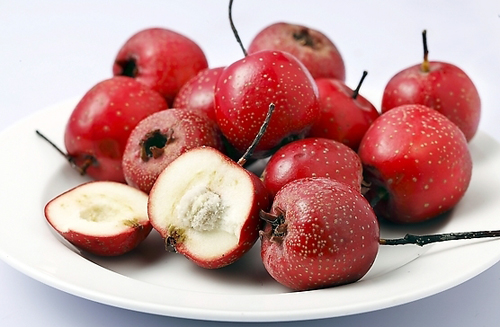VARIANT NAMES: Shucha, Yangqiu, Chiguashi, Chizao-zi, Large-fruit, Chinese Haw, Hongguo, Haihong, Sour Plum, Mountain Pear, Suanzha.
ORIGIN: The fruit of Crataegus pinnatifida or C. cuneata [Rosaceae].
CHEMICAL COMPOSITION: Containing tartaric acid,citric acid, crataegolic acid, malic acid, oleanolic acid, citric acid noids, lactone, sugars, glycosides, carotene, vitamin C and B2, nicotinic acid, protein, tannin, calcium and iron.

NATURE, FLAVOR AND CHANNEL TROPISM: Sour, sweet in flavor and slightly warm in nature, acting on the channels of the spleen, stomach and liver.
EFFICLENCIES AND INDICATIONS: Promoting digestion and strengthening the stomach, promoting blood circulation and removing blood stasis, and expelling worms. It is used for treatment of retention of meat and food in the stomach, mass in the abdomen, phlegm retention, feeling of fullness in the chest and upper abdomen, diarrhea, dysentery, hematochezia, Lumbago, hernia, Polycystic Ovarian Syndrome (PCOS), postpartum abdominal pain, Lochiorrhea, Leukorrhagia, milk stagnation of babies.
DIRECTIONS: To be eaten raw; or decocted, or boiled down into jelly, or made into pills or powder for internal use;it can also be boiled in water for external bathing, or pounded for application to the affected part. Precaution should be takea by patients suffering from deficiency of the spleen and store ach.

![Diseases, Symptoms, tcm, [tcmwindow.com]](/uploadFile/adImg/2015/4/24/6de633b8-0a7a-4546-868a-02389edf5c65.png)





